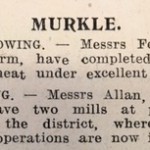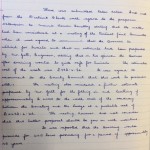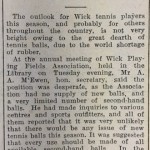In Russia on 14 March after fierce fighting German forces finally retook Kharkov in the Ukraine, which had previously been recovered by Soviet troops at the time of the liberation of Stalingrad. Also this week, on 10 March the US House of Representatives voted to extend the Lend-Lease Act, and on the 13th the Germans eradicated the Jewish ghetto in Krakow, Poland; some 14,000 Jews were sent to concentration camps.
 In Caithness, winter was still hanging on, as the log book for Bower School shows. On 11 March the head teacher recorded, “Ill-health plus a slight snow-storm has brought the attendance down to 10. I propose to cancel the attendance and dismiss school at 1 pm.”
In Caithness, winter was still hanging on, as the log book for Bower School shows. On 11 March the head teacher recorded, “Ill-health plus a slight snow-storm has brought the attendance down to 10. I propose to cancel the attendance and dismiss school at 1 pm.”

The farming year was well underway across the county. The district report for Murkle in the John O’Groat Journal reported that Messrs Farrier of West Murkle Farm had completed early sowing of wheat, and “Messrs Allan, steam mill owners, have two mills at present engaged in the district, where extensive threshing operations are now in progress.”

Thurso Town Council considered an extension to Mount Vernon cemetery on 12 March. A letter had been received from the District Joint Committee, saying they had “agreed to recommend that the terraces be utilised for burials”, and that Mr Gall, Engineer, had prepared an estimate “stating that in his opinion the terraces after draining would be quite safe for burials…. It was reported that the terracing would provide for 440 lairs providing for a period of approximately 40 years.”

Finally this week, the John O’Groat Journal reported that the war had caused an unexpected problem for Wick Playing Fields Association, namely “the great dearth of tennis balls, due to the world shortage of rubber”. They had no new tennis balls and “a very limited supply of second-hand balls.” As a rather desperate remedy it was proposed that “net quoits (similar to those played aboard ship) or outdoor badminton might be played as an alternative to tennis”
